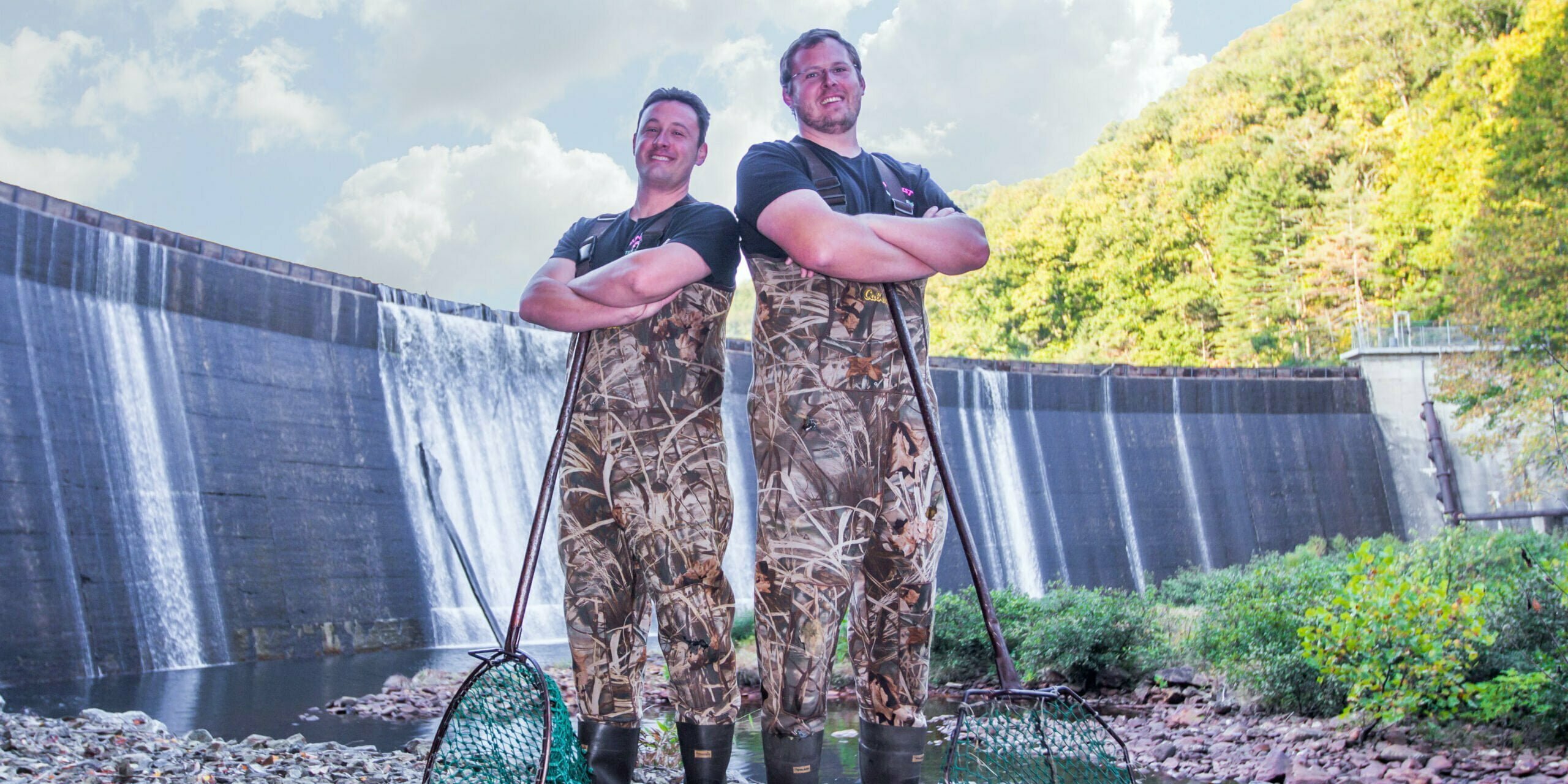“I remember shoveling fish guts, doing the hardest work on the farm,” recalls Wes Eason of Sunburst Trout Farms in Haywood County, NC. “If you’re the owner’s grandkid, you’re not getting the best jobs to start.”
Wes is now a co-owner of the third-generation family business, alongside his brother, Ben, and mother, Sally. Sunburst Trout Farms was founded in 1948, originally called Jennings Trout Farm after its founder, Dick Jennings. It was the first commercial trout farm east of the Mississippi, processing fresh filets, whole fish, and value-added products. Jennings’s daughter, Sally, and her husband, Steve Eason, came on board in 1985, followed by their sons. Now Ben manages the production locations at the farms and Wes handles the day-to-day operations and sales.
For Wes, those summer jobs prepared him to assume the position he now holds. When he unexpectedly ended up back at Sunburst shortly after college, he found a new appreciation for the family business. He says, “I was like, wow, this is a real working farm. This is the real deal. I immediately looked at it for what it was, which was a well-run business that was producing, and providing people with extremely fresh, delicious products.”
Since the Eason brothers signed on full time with the family business in the early 2000s, a lot has changed, both in the region and within the business. They have helped to grow and diversify their clientele and market outlets as well as expand the farm locations to keep up with ever- increasing demand from restaurants, distributors, and direct customer sales.
A Growing Restaurant Scene
Early on, the farm’s main outlets were through seafood wholesalers and grocery store distributors. Very few restaurants in Asheville sourced locally or promoted farm-to-table menus.
“Back in the early 2000s when I came on board, our bread and butter was not local restaurants,” says Wes. Starting in the 2010s, that changed significantly. “It was gradual, but the real year was about 2011, when it seemed that a new restaurant was opening up like every week in the Asheville area. I look at our client list and 10, 12 years ago, they didn’t even exist.”
Some of those early restaurant customers included The Market Place, Corner Kitchen, Vinnie’s Italian, and the Grove Park Inn. But Sunburst’s client list now boasts approximately 400 restaurants. Of those, 60 percent are local and receive hand deliveries.
Sally points to ASAP for laying some of the groundwork that allowed for that transition. She recalls that in the early 2000s Sunburst was selling 75 percent of their product to a national supermarket, which asked for a price reduction Sunburst couldn’t meet.
“My cash flow plummeted. I started calling potential local customers offering them our products. Thanks to ASAP’s diligent campaign to create awareness about the advantages to purchasing locally produced goods, and ASAP’s road map connecting farmers, chefs, schools, communities, grocery stores, and tailgate markets, I totally changed my customer profile. Within nine months, I had recouped that significant cash flow, and 91 percent of my sales came from within 150 miles from my farm! That trend has remained in place and continues to grow.”
In addition to restaurant and wholesale accounts, Sunburst sells to consumers via its “farm store” at the Waynesville processing plant location and at North Asheville Tailgate Market. But they’ve also seen a big shift in direct-to-consumer sales through the online store and website, which is designed and managed by Ben’s wife, Anna Eason.
“When COVID happened, when everything shut down, both here and nationwide, we lost 70 percent of our sales in the span of one week,” Wes shares. “We along with restaurants had to pivot, and due to our existing online store, we saw a 400 percent increase in our online sales.”
Challenges from Mother Nature
Sunburst values the pristine rivers that originate in the Shining Rock Wilderness Area of Pisgah National Forest. The company strives
to create an environment in which the trout they raise live as close to the way nature intended in the clear, cold waters of the
Southern Appalachians. But their greatest challenge, both historically and currently, has been Mother Nature. The trout farms are outside, mimicking a natural river, pulling water in from nearby water sources in the area. With this comes an inherent risk from floods, droughts, and other severe weather events.
In August 2021, just a couple years after opening a third farm to accommodate increasing demand, Tropical Storm Fred passed through the region. The flooding that followed displaced 70,000 pounds of fish, a $400,000 product loss. There were also significant infrastructure damages that have not yet been remediated.
“We’ve definitely gotten more resilient over the years,” Wes reflects. “It’s a little bit scary because I don’t know if we’ve got any solutions. You can’t really predict things like a 100- year flood. We also had a massive flood back in 2004.”
Still, Wes maintains a positive outlook as he, his family, and Sunburst move forward. He is excited by creative new value-added products they are able to offer customers and further possibilities of growth focusing on community collaboration.
“I think the future’s bright. More and more people are supporting local food. That doesn’t seem to be going away. Younger people are curious and interested in local products. More and more restaurants are looking at rainbow trout. We provide a fresh, high-end, quality product, and that demand seems to be continuing.”
Order Sunburst Trout products online at sunbursttrout.com, look for them in grocery stores, or visit their booth at the North Asheville Tailgate Market.

